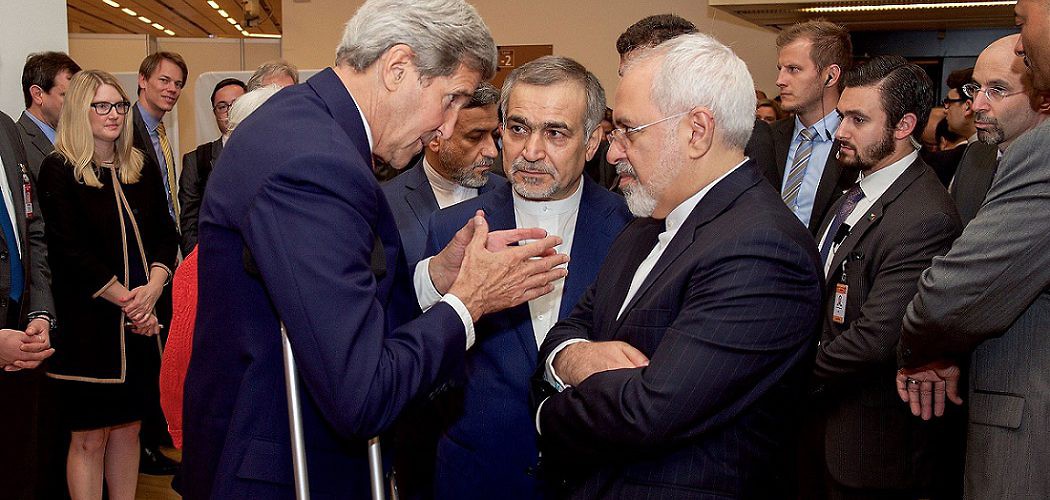U.S Secretary of State John Kerry speaks with Iranian Foreign Minister Javad Zarif and Hossein Fereydoun, the brother of Iranian President Hassan Rouhani. Vienna, Austria, July 14, 2015. (U.S. Department of State)
United Nations inspectors last week confirmed that Iran had begun to comply with the terms of an international deal on its nuclear program, which has already borne fruit in Tehran’s prisoner exchange with the United States. The Iran deal was a great reminder of the strength of diplomacy, 70 years after the UN was established to save future generations from the scourge of war. While it has arguably succeeded in preventing another great conflict, its track record on peace and security has not always been as stellar.
The US-Iran nuclear deal, which passed despite stiff domestic and Israeli opposition, joined the adoption of the 2030 Sustainable Development Agenda, and the COP 21 Paris climate change agreement among 2015’s diplomatic successes, reinforcing the need for more multilateralism in 2016 and beyond.
The 2030 agenda, for example, unlike the Millennium Development Goals of 2000 it replaced, reflects a bottom-up negotiation process by the entire UN membership. Its impact could well prove to be transformative, even as issues relating to financing and implementation need to be resolved. Equally, decisions taken by the COP 21 in Paris represent a decisive victory, particularly against climate skeptics.
The UN Secretary General Ban Ki-moon stated after COP 21: “For the first time, every country in the world has pledged to curb their emissions, strengthen resilience and act internationally and domestically to address climate change.” But, here again, follow-up action to ensure that global warming can be limited to meet the ambitious targets will need to be demonstrated.
At the multilateral level, 2015 also marked the 15th anniversary of UN Security Council Resolution 1325 on women, peace and security. Resolution 2242, passed in September 2015, affirmed the essential role of women in conflict prevention, peacemaking, and peacebuilding. Along with the establishment of the UN Women organization in 2010, this has firmly entrenched the centrality of women’s empowerment and gender equality in the international discourse.
Among the major bilateral diplomatic successes of 2015 was the normalization of relations between the US and Cuba. Japan’s apology and offer of $8 million USD to Korean “comfort women” during World War II were also widely welcomed as efforts to deal with a troublesome past.
As 2016 takes shape, major stakeholders should be more aware that the main threats to international peace and security are best handled collectively. A lot went wrong in 2015 precisely because this principle was not always upheld: the continued stalemate on Syria, with devastating humanitarian consequences; the inability to deal with the so-called Islamic State (ISIS) adequately; the deteriorating situation in Yemen, where there has been more physical destruction in five months than in Syria in five years. The Security Council roadmap for collective action against ISIS provides just that glimmer of hope. If Turkey can overcome its desire to first go after the Kurds, and the Americans and Russians come to genuinely believe that defeating ISIS and other extremists is more important than concerns over the preservation of Bashar al-Assad, cooperation may result in some hope for Syria. For this, the Saudis and their followers also need to cooperate.
Assessments of diplomatic successes are best judged against a template. That template is, in fact, enshrined in the UN Charter, in the almost forgotten Chapter VI on “Pacific Settlement of Disputes”. Instead of seeking conciliation, mediation, and judicial settlement, as provided for in Article 33 of this chapter, the previous 15 years have been marked by the desire to use force with or without the Security Council’s authorization under Chapter VII.
In 2003, Iraq witnessed military action when a skeptical Security Council refused to be persuaded by the slender evidence of the existence of weapons of mass destruction. In Libya 2011, council authorization was forthcoming in what later turned out to be a barely disguised attempt at regime change. The horrific consequences of the civil war in Syria are still playing out. Clearly, Iraq 2003, Libya 2011, and Syria now, provide the most eloquent testimony on the failure of diplomacy. When diplomacy fails or is abandoned, the wheels of war start to grind. The consequences of military action in Iraq, Libya, and Syria laid the basis for the emergence of ISIS. What we have not seen in 2015—and would be lucky to see in 2016—is a reversion to the Charter and an acknowledgement that conflict prevention is the best diplomacy.
This year will not be like any other normal year. The US will elect its 45th president. The UN will elect its ninth secretary general. Both will be expected to play an important role in determining the contours of peace and security and economic and social development, impacting large parts of the world. Equally, occupants of these high offices invariably turn to issues that will define their legacy in the years ahead. It is, however, necessary to distinguish between developments that just make news and diplomatic initiatives that will alter the course of history for the better. US President Barack Obama is citing the Iranian nuclear deal and COP 21, along with the normalization of relations with Cuba, as his legacy. Looking closely at some of these achievements, it is clear that multilateralism has been indispensable.
A version of this article originally appeared on the Indian Express.





